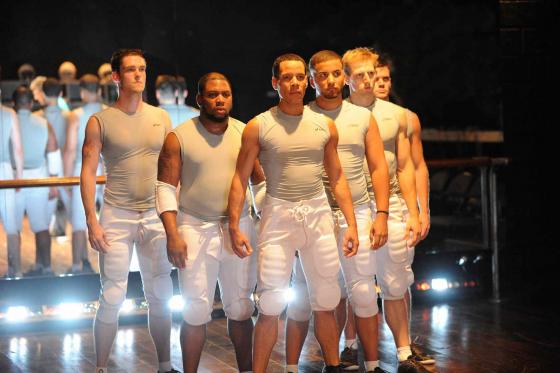Tomorrow marks exactly two months before the United Kingdom is scheduled to leave the European Union on March 29, 2019. And Parliament is expected to vote on Prime Minister Theresa May’s new plan for departure. Her most recent deal crashed in Parliament earlier this month by 230 votes. May has since been working to form a new plan that lawmakers can agree to. Failure to reach an agreement could result in a “no-deal” Brexit or possibly a second EU membership referendum.
When keeping up with the latest Brexit news, it’s hard not to think back to Labour of Love, the political comedy by James Graham that played at Olney in September and October of this past year. This play was set in the office of a Labour MP and traced the tumultuous journey of the Labour Party over the past three decades. The play begins in 2017 after the snap General Election called by Theresa May in the wake of the Brexit vote.
Reading the news, it’s also hard not to think ahead to Once, the musical that will be opening at Olney in just under two weeks. Once is set in Dublin, Ireland and follows the emotional journey of two troubled independent musicians who meet each other at the perfect moment in time. Though Once is not political in nature in the way Labour of Love is, and though the writing of Once predates the Brexit crisis, it’s fascinating to note how these two worlds now intersect on the subject of Brexit.
A BIT OF BACKGROUND...
Ireland joined the European Economic Community (now the European Union) in 1973. Joining the EU has greatly fortified Ireland's development as a country, and Irish views and interests are now reflected in the policies of the EU. This led to a dramatic increase in jobs, foreign investment, and agricultural funding. The country received over €74.3 billion from the EU between 1973 and 2015, and Irish citizens can move, work, and reside freely in EU countries.
Brexit border dilemma?
The aftermath of Brexit has the potential to create a border crisis between the Republic of Ireland, an independent country, and Northern Ireland, a country of the United Kingdom. This border is the only overland border of the UK. Because both Ireland and the UK were part of the EU Customs Union, trade and travel between the countries has been relatively easy. But now the UK wants to reassert power over its own borders.
Originally the border between ROI and NI was drawn in 1920 with the Government of Ireland Act, when people in the south identified as Nationalist, Catholic, and Irish and people in the north identified as Unionist, Protestant, and British. The partition caused a trade war between the two over produce, steel, and coal. It also resulted in guerrilla warfare between the Irish Republican Army (IRA) of the ROI and Unionist paramilitaries of NI. The violence lasted for three decades, killing over 36,000 people. But in 1998, a peace deal known as the Good Friday Agreement was signed. It stated that the two would remain separate, but individuals in NI were eligible for both Irish and UK citizenship. Additionally, NI would be allowed to vote for independence in the future. Peace was restored and today there are over 270 public crossings at the border.
The Brexit vote could potentially reignite some of the conflict at the border. The status of the border is one of the top three concerns in Brexit negotiations. There is now a question of whether or not the UK should leave the EU Customs Union and adhere to the wishes of Leave voters, who want independent trade policy. Either way, there is likely to be some violation of the Good Friday Agreement.







